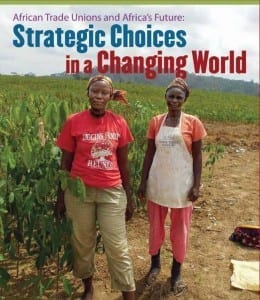 The rapid economic growth of many African countries is not translating into good jobs or worker rights, especially for women, and worker organizations, governments and business must be more proactive in expanding employment and improving wages and social protections, according to a new Solidarity Center report.
The rapid economic growth of many African countries is not translating into good jobs or worker rights, especially for women, and worker organizations, governments and business must be more proactive in expanding employment and improving wages and social protections, according to a new Solidarity Center report.
“African Trade Unions and Africa’s Future: Strategic Choices in a Changing World” calls for measures to promote job creation, secure worker rights, invest in social and physical infrastructure and achieve gender equality.
Based on a 2013 survey of trade unionists in nine African countries, the report finds that trade unions have played a significant part in the political and economic lives of their countries, for instance by shaping policy around issues such as the minimum wage and social insurance coverage, and in promoting and defending democratic institutions.
But rapid globalization has created new challenges that will most effectively be solved through coordination among unions, government and business. Some of measures the report calls for include:
• Confronting obstacles to equal rights and equal participation for women. Sustainable development and inclusive economic growth are only possible when gender inequity, a key human rights component, is integrated throughout the process. Such actions should include opening up economic sectors and occupations that are still largely closed to women, as well as advancing education for women and social support for family obligations now primarily met by women.
• Taking innovative approaches to addressing the informal economy.National and global economic trends suggest that the proportion of workers in formal employment will continue to decrease. Worker associations and African governments need to share experiences and invest more resources to empower workers in the informal economy and extend social protections to informal-sector workers, especially women.
• Enforcing existing international worker rights standards. A broad body of international and national laws and standards protects workers and their rights, but they generally are not enforced, including by countries participating in programs like the Africa Growth and Opportunity Act (AGOA). As a result, workers are vulnerable to abuses such as unsafe and unhealthy workplaces, forced labor, lost wages, sexual harassment and workplace violence.
Released on the eve of the August 5–6 White House Africa Leaders Summit and the annual AGOA meeting, African Trade Unions and Africa’s Future serves as a clear call to action to the continent’s most powerful leaders and policymakers.
